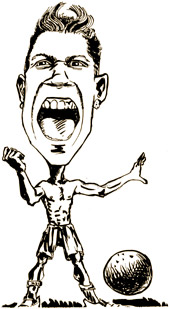 |
Football’s latest metrosexual poster boy has nearly arrived. But before that, tomorrow, Cristiano Ronaldo has promises to keep
In an age when many post-pubescent girls prefer to announce their ardour through public Internet blogs rather than private, rose-scented letters, it is easy to find out what they think of Cristiano Ronaldo. Serious soccer lovers may believe the teenage Portuguese midfielder has a head for goals — after all, the two he has scored in the Euro 2004 are headers — but the girls screaming in bold caps on the worldwide web have other parts of his anatomy on their restless minds. His beefcake torso, his cupcake face and, yes, “those wonderful, long legs,” are their latest hotline to heaven.
Bye-bye David Beckham; football’s latest metrosexual poster boy — he of the sublime dribbling skills and the lovely earrings — has arrived. Last year, when the 19-year-old, went from Lisbon to Manchester United for a price of £12.24 million — the most high-priced teenage transfer in the English Premier League — and put on the famous seven jersey of Posh Spice’s errant husband, most wondered if the rookie was value for that kind of money. And after his first Premier League season the well-informed verdict (not that of hysterical girls in the throes of first crushes) was that he was immensely talented but still some way off from being a finished product. An “almost-there” who was yet “not-quite-there”.
But now opinions are being revised almost at the pace Ronaldo outruns the opposition full-backs in Euro 2004. OK, he conceded an inept penalty against Greece (though he did try to make up with a late, futile goal). OK, England full-back Ashley Cole had him under control. But on most occasions, the effervescent Ronaldo has left defenders either hacking at his heels or simply chasing shadows. His twists and turns and showboating stepovers have left the crowd electrified.
Few footballers can entertain the way Ronaldo does. The final pass still lacks the Beckham-like precision but it is easy to see why the boy who was born in a tin-roofed shack in the island of Madeira off the Moroccan coast and named after the former American President who died last month has become the symbol of a new, brave and confident Portugal.
Being born with a name that instantly reminds you of a bigger and better footballer — in this case, Brazil and Real Madrid’s striker Ronaldo — can be a huge disadvantage. A cricketer with the surname of Tendulkar or a tennis player called Navratilova can spend an eternity trying to carve out his/her own identity.
But in one swift season Ronaldo has emerged from the shadows of his illustrious namesake and the label of the Portuguese Ronaldo. He is not seen as a poor copy of the original or a usurper to the great name but a star in his own right. Cristiano Ronaldo dos Santos Aveiro is not the same as Brazil’s Luiz Nazario De Lima, better known as Ronaldo — he has a name of his own.
The new Ronaldo is other things too. His rise is emblematic of the emergence of a new global football pantheon. Ageing Portuguese maestro Luis Figo may well be playing his last major international tournament, French master Zinedine Zidane is not getting any younger and David Beckham is somewhat yesterday’s star.
Along with England’s Wayne Rooney, Ronaldo is undoubtedly the face of football’s corporate future, the rising star who can be converted into a best-selling brand like Beckham. And, like the England captain, he has started to change his hairstyle every six weeks. And, to the disappointment of those teenage girls who ooh and aah with every move he makes, who profess their undying lust for him on the Web, he has dated models such as Jordana Jardel, occasionally referred to as the new Posh.
That he trains alongside the other famous R’s in Man U — Roy Keane, Ryan Giggs, Rio Ferdinand and Ruud van Nistelrooy — and earns £30,000 a week means he has arrived both as a footballer and a star.
Not bad for someone who learnt his football in the dusty backstreets of Madeira, whose father carried football kits in a small club and whose family home could be reached only by crossing fetid vegetation. By the time he was 12, Ronaldo was already the best player on the island and a year later was bought by Sporting Lisbon, the club he adored since childhood.
It wasn’t easy in Lisbon. His Madeira accent was mocked by the local players and the teenager fought back. But the taunting died down as his pace and dribbling skills wowed the crowd. Last year, Manchester United manager Alex Ferguson snapped him up after his team was at the receiving end in a friendly game against Sporting Lisbon. In his English Premier League debut season, Ronaldo both dazzled and disappointed. Although his twinkle-toes left defenders despairing, his crowd-pleasing footwork didn’t always add value to his side. But his goal against Millwall in the FA Cup final (another header, of course) sent his stocks soaring high again.
Euro 2004, perhaps, is a better indicator of the player and the star Ronaldo could eventually become. His well-directed glancing header against the Dutch in the quarters showed his sense of the occasion. The referee may not have liked his shirtless celebration but the teen scream brigade, and perhaps, the Portuguese gay community, certainly did.
Now, with Portugal standing at the cusp of claiming its biggest ever sporting prize, Ronaldo has more promises to keep tomorrow. Another heady goal and another shirtless celebration (à la Sourav Ganguly) against Greece might make him the superstar the world believes he will eventually be.
Ronaldo is reaching for the stars. And the multinationals for their chequebooks.











